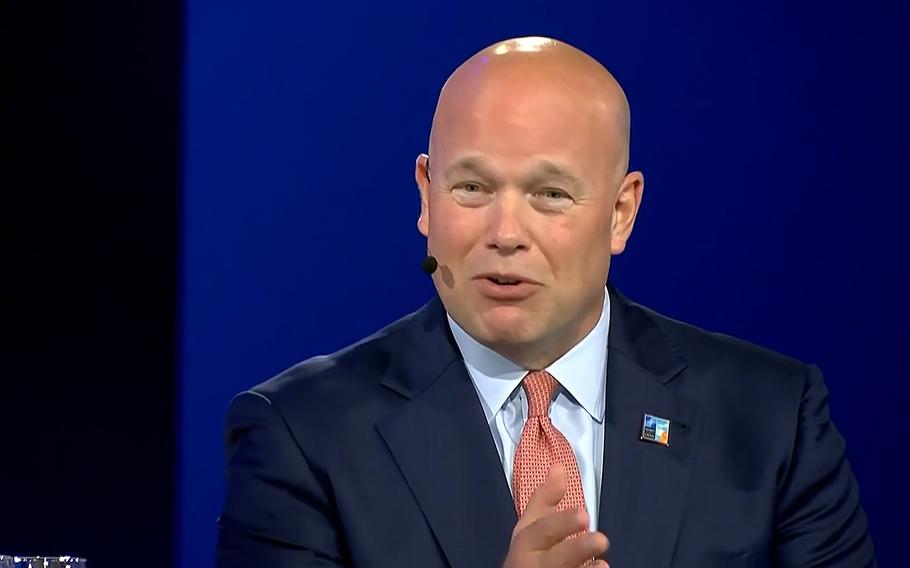
In a screenshot from social media, U.S. Ambassador to NATO Matthew Whitaker speaks at the NATO Public Forum in The Hague, Netherlands, June 24, 2025, at the beginning of the alliance's two-day summit. (X/U.S. Mission to NATO)
The top U.S. official at NATO affirmed Tuesday that there will be no hasty military withdrawal from Europe, as President Donald Trump and other leaders gather in Brussels for an expected military spending deal.
U.S. Ambassador Matthew Whitaker, speaking at NATO’s summit in the Dutch city of The Hague, sought to ease concerns about the future level of commitment to an alliance that has faced heavy criticism from Trump in the past.
“The United States isn’t going anywhere. We’re expecting our European allies to step up to be equal partners with us in the alliance,” Whitaker said. “And again, that strength, with all 32 allies, is what’s going to deliver that peace. But the United States is here to stay.”
Whitaker’s comments came at the start of the two-day summit, where Trump’s spending priority is at the top of the agenda.
Whitaker said Trump’s demand that members dedicate 5% of gross domestic product on defense, up from the current 2% level, was expected to be finalized when leaders meet Wednesday.
“It’s probably one of the most consequential moments in this alliance’s history,” he said.
In Europe, there has been uncertainty about the future role of the United States in NATO and its commitment to keeping troops based on the Continent.
With the U.S. increasingly focused on the Asia-Pacific region and countering China, the Pentagon’s expectation is that allies in Europe develop the capabilities needed to handle most of the Continent’s security requirements.
While the U.S. hasn’t announced any drawdown plans, an ongoing global force posture review is likely to have implications for American military missions in Europe.
Trump rattled allies during his first term when he debuted at the 2017 NATO summit with a tough message about defense spending and a warning that the U.S.’s commitment to the alliance hinged on Europe shouldering more of the security burden.
At the time, most of the alliance’s members were well short of an alliance benchmark that called for dedicating 2% of GDP on defense.
In the years since, allies have fretted about Trump’s various statements related to the alliance and Washington’s questionable willingness to come to Europe’s defense in the event of an attack from Russia.
However, Whitaker’s statements at the opening of NATO’s summit Tuesday suggested that the alliance’s standing in Trump’s eyes could be improving.
“We’re going to have a strong alliance. We’re going to have a lethal alliance,” Whitaker said. “And most importantly, that strength is what’s going to deliver peace for generations to come, because no one will want to mess with NATO and the Alliance.”
Whitaker, whom Trump selected to serve as the U.S.’s top ambassador to NATO, added that the alliance “is more relevant today than probably it ever has been since the end of the Cold War.”
One factor that could make this year’s summit less contentious than 2017’s is that major allies such as Germany have pledged to meet Trump’s spending requirements.
Germany’s years of underinvestment in defense were a focal point for Trump’s criticisms of NATO and one of the reasons he sought to withdraw some 12,000 troops from the country during his first term.
During a meeting with German Chancellor Friedrich Merz at the White House in June, Trump said he intended to keep American troops in the country.
Whitaker also singled Germany out Tuesday as a key force behind recent increases in Europe defense spending levels.
NATO Secretary-General Mark Rutte said Tuesday that he was confident the U.S. remains committed to the alliance.
“My message to my European colleagues is stop worrying so much,” Rutte said. “Start to make sure that you get investment plans down, that you get industrial base up and running.
“Stop running around being worried about the U.S. They are there. They are with us.”